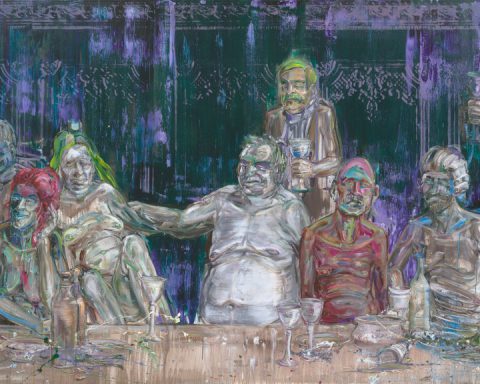Leipzig’s 1003rd summer lights up its coda, scorching the remains of the mid-European dress code to loincloths.
At midday, trees are teabags in the steaming kettles of parks.
At midnight, we wonder from our damp bed sheets if, at dawn, we will find our alleys aligned with banana palms instead of lime trees, and, in the sleepless maze, we envy Mediterranean countries, not for their azure horizons – our lakes are just as good – but for the ubiquitous air conditioners, which we swear to purchase here and now, prices be hanged.
It is still without an air conditioner but with a head somewhat cooled by tap water that I’m writing this. Still, I’m burning with all the songs of Leipzig I have been privileged to read. Not Homer-blind but blindfolded – not literally but literarily, a mock-Themis of words – I didn’t know the names of the bards whom I’m now writing about until after I selected them.

The winners of Leipzig’s 1003 Nights quadrilingual literary contest are…
Poetry
“Leipzig – старі липи як сходи“ / “Old lime trees like stairs…”– Viacheslav Huk (Ukrainian)
An indomitably rhythmical evocation of Leipzig’s wartime past of over 70 years ago, before the layers of post-industrial, post-Wall sleekness and all kinds of chic from Jugendstil to Gründerzeit to Bohemian coated it – when the now shallow White Elster River still rolls its “fat waves”. The dexterity of raw imagery and elegant syllabics, the tangibility of this vanished world – yet by spirit very recognizably Leipzig, whether the author has ever actually been here.
Fiction
“Und weiter und fort” / “On and on” – Julie Sophia Schöttner (German)
A seemingly simple account of a failed after-disco date: “We are young, we are beautiful”; “I have forgotten what it’s like not to laugh”. It might have happened anywhere in a big city, yet, somehow between the lines, the breath of Leipzig is tangible. A story very much in the present, an epitome of millennial wistfulness, nostalgia, relationship fetus miscarried. I was completely taken by the smooth flow of the story, “on and on”, and by the author’s wise, melancholy compassion to her Russian-born, German-bred alter ego and her charming shallow dance partner.
Mixed Genre
“Memoir of an Anarchist City” – Adam Carrington (English)
A jarring mix of historical tenses and genres fitted in two pages, melodrama-fiction, the noir-humorous interpretation of Charlemagne’s conquest of Leipzig’s plains. The piece is a terse fable embracing the past and a dystopian future in a never-ending spiral curl. I was much impressed by the flexibility of language, ranging from lyrical to tour-de-force.

And here are the runners-up…
“словно Фома под марш Мендельсона” / “Like Thomas to Mendelssohn’s Wedding March” – Olga Bragina (Russian)
I liked this stream-of-consciousness poem with Leipzig elements woven into a tapestry pattern of a Germanophile literary reader – a maze of well-combined imagery.
“One Crazy Knight in Leipzig” – Glenn Horvath (English)
Diaries of a modern-day expat madman, atmospheric, wittily rendering various struggles of a vagrant mind: foreign language, identity and the eternal search for truth – Ken Kesey’s Patrick McMurphy in Leipzig.
“сколько лет ты дочь?“ / “How long have you been a daughter?” – Iya Kiva (Russian)
This piece moved me deeply. Not directly connected with Leipzig, it raises the painful topic of forced displacements, loss of motherland to modern-day atrocities – here, the current civil war in Ukraine, now largely forgotten, ousted from the European minds. It was on the long Leipzig nights that the thoughts of the violated Eastern Ukraine, of my Donetsk friends who had to become refugees, of my bombarded alma mater in Horlivka tormented me – in my personal history, Leipzig is chained to the focal point of the poem.

I’m sending this report off now, with gratitude to LeipGlo for entrusting me with the task of judging the 1003 Nights Literary Contest. I’m having another sip of tap water. My blindfold mask has fallen, the authors have returned to their word-children and my curiosity has been quenched, as has my quadrilingual спрага, Durst, жажда, thirst.
Editor’s note: Besides publication advice from the judge, the winners will have each of their contest entries individually published on The Leipzig Glocal, along with a photo and short profile. They will also be able to choose one item from the LeipGlo Spreadshirt shop as a prize, and to perform, or have their piece performed in their absence, at our next Cocktail Open Mic (14 September 2018). The other finalists’ pieces will be published on our site as one post with a short intro by the judge.





